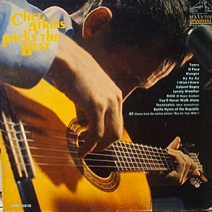This article needs additional citations for verification .(February 2024) |
| Chet Atkins Picks the Best | ||||
|---|---|---|---|---|
 | ||||
| Studio album by | ||||
| Released | 1967 | |||
| Recorded | RCA "Nashville Sound" Studios, Nashville, TN | |||
| Genre | Country, pop | |||
| Label | RCA Victor LSP-3818 (Stereo) | |||
| Producer | Bob Ferguson, Chet Atkins | |||
| Chet Atkins chronology | ||||
| ||||
Chet Atkins Picks the Best is the thirty-second studio album by guitarist Chet Atkins. At the Grammy Awards of 1968, Chet Atkins Picks the Best won the Grammy Award for Best Pop Instrumental Performance. [1] [2]